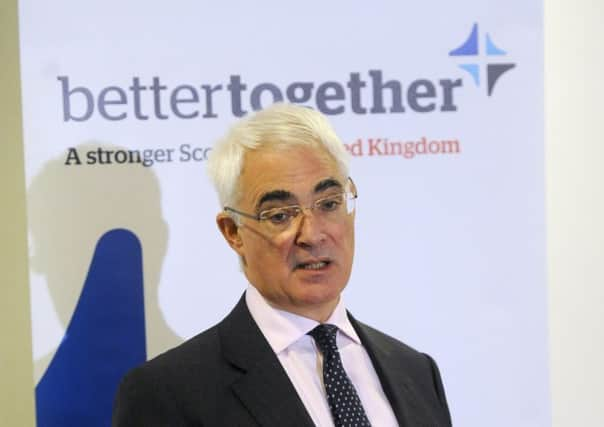Euan McColm: '˜No' campaign is vulnerable without a leader


But when a dominant political force becomes complacent, a smart opposition is handed an opportunity. Look at Scottish Labour, many of whose MPs sat on their flabby backsides for decades, assuming that they were in jobs for life. Eventually, voters grew weary of elected representatives who seemed more interested in their own careers than in creating a better Scotland and they became vulnerable to the overtures of the SNP.
Suddenly polls that had been completely reassuring changed, illustrating a swift and brutal shift in public opinion that laid Scottish Labour low.
Advertisement
Hide AdAdvertisement
Hide AdThose who favour the endurance of the Union over Scottish independence may presently take some comfort from polls that show a majority of Scots prefer to remain within the United Kingdom. The two years that have passed since the independence referendum may have seen the SNP become the dominant political force across the country but the party’s raison d’être remains of interest to the minority.
But polls change, don’t they?
A year before the last referendum, polls showed that fewer than 30 per cent of Scots were in favour of independence. This had been the case for years and not even two consecutive Holyrood election victories for the SNP had made much difference to the numbers.
By referendum day, not a kick in the bahookey off 45 per cent of Scots were committed to ending the Union with England. Sure, a 10 point victory for the Better Together campaign was decisive but the Yes Scotland campaign outran expectations by some considerable distance.
Last Sunday First Minister Nicola Sturgeon killed off civic nationalism. After years during which the SNP has tried to persuade Scottish voters that its was not like all those other nationalisms, fuelled by blood and soil, she conceded that, for her, independence transcended everything, including the economy.
On the same day, various high profile Yes campaigners gathered at an event in Glasgow to listen to speeches and watch performances by key figures in the pro-independence movement. A few hundred yards away, on Glasgow Green, hundreds more assembled to demand a second referendum.
There is no doubt that the clamour among nationalists for a second crack at breaking-up the UK grows ever stronger. And it would appear that Ms Sturgeon is minded to give them what they want.
Unionists should be concerned.
After the last referendum, the No campaign fragmented and its members went back to normal life. Politicians who had stood shoulder to shoulder with each other resumed traditional hostilities. Members of the public who had given up weekends and evenings to deliver leaflets and man stalls returned to glorious inactivity. Who wants to sit in a community centre listening to middle-aged men drone on when there’s Bake Off on the telly and beer in the fridge?
Pro-Independence politicians and campaigners, on the other hand, remained on a war footing: not a weekend has passed without news of some pro-independence event or another taking place; nary a day has gone by without the First Minister or her predecessor, Alex Salmond, loudly proclaiming that the case for independence is stronger than it used to be.
Advertisement
Hide AdAdvertisement
Hide AdIt is often said of Ms Sturgeon that she is a more cautious politician than Mr Salmond and this, thus far, has been true. But her remarks last weekend hint that she may be ready to go for broke on the independence question. This should not be surprising - there is always an element of risk in calling a referendum; no guarantee of success can be secured.
If Ms Sturgeon does go hell for leather in favour of the end of the Union, she will have the support of a large group of campaigners, match-fit and eager to get cracking.
But what of the pro-union campaign? The chairman of the Better Together campaign, Alistair Darling, has done his shift and moved on to new challenges in the House of Lords and industry, and the Tory and Labour politicians who once united against the common enemy of nationalism are now at each others throats, fighting for second place in a first-past-the-post electoral system that favours the SNP.
Little is being done behind the scenes to address this lack of a pro-Union campaign. Meetings are not being held, alliances are not being built.
This complacency might yet be the undoing of the United Kingdom.
If Ms Sturgeon was to announce tomorrow that she was calling a second referendum, she could depend on a well-resourced and experienced team behind her. Members of the Greens and smaller left-wing parties would fall into line behind her leadership. Perhaps even some members of the Labour Party would be willing to support her proposal.
How quickly could the unionist parties respond? Who would lead the campaign? Who would fund it?
Polls that continue to show a majority of Scots are in favour of the UK may provide some reassurance to Unionists but polls can shift. And it can take considerable effort to prevent them from doing so.
If Nicola Sturgeon decides to call a second referendum, her secret weapon may be a pro-union campaign caught on the hop and woefully unprepared to take her on.